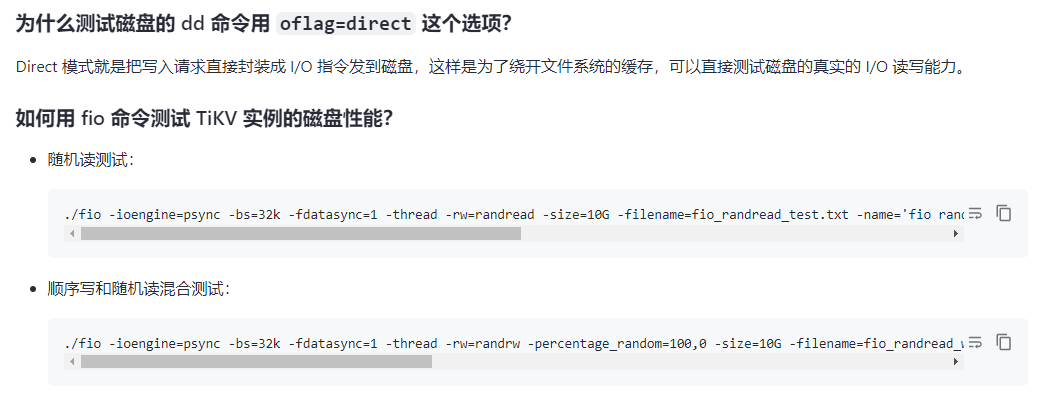Note:
This topic has been translated from a Chinese forum by GPT and might contain errors.Original topic: 这样的ssd硬盘性能能否达到tikv的生产环境的要求
Hard disk test results:
The main test is random read/write
Can such performance be used in the TiKV production environment?
root@localhost:/# sudo fio --filename=/dev/nvme1n1p1 --direct=1 --rw=randrw --bs=4k --numjobs=16 --iodepth=64 --runtime=300 --time_based --group_reporting --name=randrw-test
randrw-test: (g=0): rw=randrw, bs=(R) 4096B-4096B, (W) 4096B-4096B, (T) 4096B-4096B, ioengine=psync, iodepth=64
...
fio-3.36
Starting 16 processes
note: both iodepth >= 1 and synchronous I/O engine are selected, queue depth will be capped at 1
note: both iodepth >= 1 and synchronous I/O engine are selected, queue depth will be capped at 1
note: both iodepth >= 1 and synchronous I/O engine are selected, queue depth will be capped at 1
note: both iodepth >= 1 and synchronous I/O engine are selected, queue depth will be capped at 1
note: both iodepth >= 1 and synchronous I/O engine are selected, queue depth will be capped at 1
note: both iodepth >= 1 and synchronous I/O engine are selected, queue depth will be capped at 1
note: both iodepth >= 1 and synchronous I/O engine are selected, queue depth will be capped at 1
note: both iodepth >= 1 and synchronous I/O engine are selected, queue depth will be capped at 1
note: both iodepth >= 1 and synchronous I/O engine are selected, queue depth will be capped at 1
note: both iodepth >= 1 and synchronous I/O engine are selected, queue depth will be capped at 1
note: both iodepth >= 1 and synchronous I/O engine are selected, queue depth will be capped at 1
note: both iodepth >= 1 and synchronous I/O engine are selected, queue depth will be capped at 1
note: both iodepth >= 1 and synchronous I/O engine are selected, queue depth will be capped at 1
note: both iodepth >= 1 and synchronous I/O engine are selected, queue depth will be capped at 1
note: both iodepth >= 1 and synchronous I/O engine are selected, queue depth will be capped at 1
note: both iodepth >= 1 and synchronous I/O engine are selected, queue depth will be capped at 1
Jobs: 16 (f=16): [m(16)][100.0%][r=69.0MiB/s,w=69.1MiB/s][r=17.7k,w=17.7k IOPS][eta 00m:00s]
randrw-test: (groupid=0, jobs=16): err= 0: pid=88434: Thu Jun 6 09:55:32 2024
read: IOPS=13.4k, BW=52.2MiB/s (54.7MB/s)(15.3GiB/300003msec)
clat (usec): min=15, max=15414, avg=410.30, stdev=818.46
lat (usec): min=15, max=15415, avg=410.54, stdev=818.45
clat percentiles (usec):
| 1.00th=[ 52], 5.00th=[ 78], 10.00th=[ 82], 20.00th=[ 86],
| 30.00th=[ 91], 40.00th=[ 98], 50.00th=[ 106], 60.00th=[ 119],
| 70.00th=[ 147], 80.00th=[ 219], 90.00th=[ 2212], 95.00th=[ 2540],
| 99.00th=[ 3359], 99.50th=[ 3523], 99.90th=[ 3916], 99.95th=[ 4359],
| 99.99th=[10552]
bw ( KiB/s): min= 5512, max=89968, per=100.00%, avg=53463.39, stdev=1401.22, samples=9584
iops : min= 1378, max=22492, avg=13364.32, stdev=350.37, samples=9584
write: IOPS=13.4k, BW=52.2MiB/s (54.8MB/s)(15.3GiB/300003msec); 0 zone resets
clat (usec): min=12, max=168037, avg=780.68, stdev=3732.68
lat (usec): min=12, max=168037, avg=781.07, stdev=3732.69
clat percentiles (usec):
| 1.00th=[ 20], 5.00th=[ 23], 10.00th=[ 25], 20.00th=[ 29],
| 30.00th=[ 32], 40.00th=[ 38], 50.00th=[ 45], 60.00th=[ 68],
| 70.00th=[ 122], 80.00th=[ 186], 90.00th=[ 2540], 95.00th=[ 3032],
| 99.00th=[ 5800], 99.50th=[32375], 99.90th=[48497], 99.95th=[55837],
| 99.99th=[76022]
bw ( KiB/s): min= 5384, max=91754, per=100.00%, avg=53507.87, stdev=1405.20, samples=9584
iops : min= 1346, max=22938, avg=13375.42, stdev=351.36, samples=9584
lat (usec) : 20=0.79%, 50=26.40%, 100=27.58%, 250=28.52%, 500=2.92%
lat (usec) : 750=0.40%, 1000=0.02%
lat (msec) : 2=0.08%, 4=12.41%, 10=0.50%, 20=0.02%, 50=0.32%
lat (msec) : 100=0.04%, 250=0.01%
cpu : usr=1.05%, sys=2.84%, ctx=8016130, majf=0, minf=73013
IO depths : 1=100.0%, 2=0.0%, 4=0.0%, 8=0.0%, 16=0.0%, 32=0.0%, >=64=0.0%
submit : 0=0.0%, 4=100.0%, 8=0.0%, 16=0.0%, 32=0.0%, 64=0.0%, >=64=0.0%
complete : 0=0.0%, 4=100.0%, 8=0.0%, 16=0.0%, 32=0.0%, 64=0.0%, >=64=0.0%
issued rwts: total=4008043,4011383,0,0 short=0,0,0,0 dropped=0,0,0,0
latency : target=0, window=0, percentile=100.00%, depth=64
Run status group 0 (all jobs):
READ: bw=52.2MiB/s (54.7MB/s), 52.2MiB/s-52.2MiB/s (54.7MB/s-54.7MB/s), io=15.3GiB (16.4GB), run=300003-300003msec
WRITE: bw=52.2MiB/s (54.8MB/s), 52.2MiB/s-52.2MiB/s (54.8MB/s-54.8MB/s), io=15.3GiB (16.4GB), run=300003-300003msec
Disk stats (read/write):
nvme1n1: ios=4004789/4008004, sectors=32040408/32064032, merge=0/0, ticks=1552885/3034191, in_queue=4587077, util=100.00%
Another software test result:
root@localhost:/data# sudo sysbench fileio --file-total-size=1G --file-test-mode=rndrw --max-time=300 --max-requests=0 --file-extra-flags=direct run
WARNING: --max-time is deprecated, use --time instead
sysbench 1.0.20 (using system LuaJIT 2.1.0-beta3)
Running the test with following options:
Number of threads: 1
Initializing random number generator from current time
Extra file open flags: directio
128 files, 8MiB each
1GiB total file size
Block size 16KiB
Number of IO requests: 0
Read/Write ratio for combined random IO test: 1.50
Periodic FSYNC enabled, calling fsync() each 100 requests.
Calling fsync() at the end of test, Enabled.
Using synchronous I/O mode
Doing random r/w test
Initializing worker threads...
Threads started!
File operations:
reads/s: 1032.92
writes/s: 688.61
fsyncs/s: 2203.75
Throughput:
read, MiB/s: 16.14
written, MiB/s: 10.76
General statistics:
total time: 300.0530s
total number of events: 1177676
Latency (ms):
min: 0.02
avg: 0.25
max: 11.82
95th percentile: 0.46
sum: 298953.00
Threads fairness:
events (avg/stddev): 1177676.0000/0.00
execution time (avg/stddev): 298.9530/0.00
